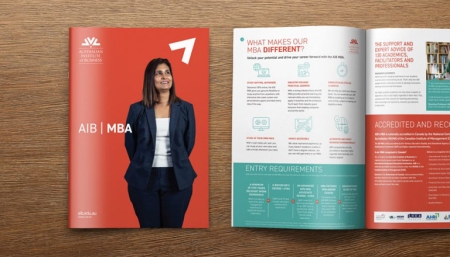The top 9 skills employers are looking for in 2025

2025 is here, and with it comes a new workplace era. The adoption of new technologies, increased cybersecurity threats, rise of hybrid and remote work models, demand for greater flexibility and ongoing global uncertainties are creating both challenges and opportunities for businesses and professionals. Versatile professionals are in high demand as employers seek workers who can not only keep pace with change but drive it.
Drawing on the industry expertise of three highly accomplished AIB MBA alumni, this article explores the top technical, interpersonal and future-focused skills employers will prioritise in 2025. Matt Connell, Deputy CEO and General Manager of People and Culture at Cultura, Theone Conradie, General Manager and Lead Consultant at People Capital Consultants, and Stella Cooper, People Development and Business Coach at WestCoast HR Services, bring a wealth of knowledge in human resources and organisational development. Their collective insights are grounded in real-world experience and offer a deep understanding of the into the future of work including:
- Digital literacy
- Sustainability
- Ability to use AI
- Communication and collaboration
- Emotional intelligence (EQ)
- Cultural awareness
- Critical thinking and problem-solving
- Change management
- Resilience
From embracing AI to fostering cultural awareness, this guide will help you identify the top skills that will help you stand out in 2025 and beyond.
Technical skills
Digital literacy
Deloitte Access Economics estimates that 87% of jobs in Australia require digital literacy skills, and by 2025 the country will need another 156,000 digital technology workers. As businesses adopt more advanced technologies, digital tools and analytics will be the foundation of efficiency and innovation. From interpreting customer behaviour to optimising supply chains, employers skilled in analysing and applying digital data insights will become invaluable.
Sustainability
Companies are being held increasingly accountable for their environmental footprint, driving the demand for professionals who can design and implement sustainable solutions. The Deloitte Global 2024 Gen Z and Millennial Survey found that environmental sustainability continues to be among Gen Zs’ and millennials’ top priorities, and they are pushing businesses to drive change through their career decisions and consumer behaviours. 81% believe that business should do more to enable consumers to make more sustainable purchasing decisions, while 54% say they and their colleagues are putting pressure on their employers to take action on climate change, a trend that has steadily increased since 2022. Expertise in environmental regulations and sustainable technologies will be key for helping organisations align with consumer values and achieving long-term business growth.
Ability to use Artificial Intelligence (AI)
The ability to use AI effectively is transforming workplace productivity. Employees must go beyond basic understanding and learn to leverage AI tools to streamline processes, decision-making and efficiency. Viewing AI as a collaborative tool, rather than a threat, will be crucial for thriving in the modern workforce.
Everyone is aware of the concept of AI but there is a long way to go in understanding how to effectively harness this powerful tool in a safe and strategic manner. Organisations are not aware of how quickly they are giving away their intellectual property without realising, through staff members who are accessing AI for work purposes. Leadership roles must understand the risks associated with this type of efficiency and direct their efforts to ensure they are getting a strategic advantage, as well as efficiency.
Matt Connell
Soft skills
Communication and collaboration
Successful teams and organisations are built on strong communication and collaboration skills. Articulating thoughts clearly, actively listening and working together towards shared goals makes teams more effective and productive. In today’s world of remote and hybrid work, professionals who excel at these skills will be instrumental in keeping teams connected and aligned, regardless of their location.
Emotional intelligence (EQ)
Leaders with high emotional intelligence bring a unique advantage to the workplace by cultivating an environment where employees feel valued and engaged. By understanding their emotions and those of others, they can approach challenges with empathy and tact. Leaders with high EQ are better at building meaningful relationships, motivating teams, managing stress and resolving conflicts. Forbes listed emotional intelligence as the number 1 soft skill for 2025, stating, “Emotional intelligence is perhaps the most essential soft skill you could ever have.”
Cultural awareness
Embracing cultural differences allows professionals to thrive in diverse workplaces and global industries. With businesses operating across borders, professionals who understand different values, traditions and communication styles can build inclusive teams, navigate international markets and communicate with colleagues and clients from various backgrounds.
Cultural awareness is that is a necessary level of understanding with the changing face of organisations and migration trends across the world.
Matt Connell
Future-focused skills
Critical thinking and problem-solving
Critical thinking and problem-solving skills help teams make better decisions, streamline processes and adapt when things don’t go as planned. By combining logical analysis with creative thinking, critical problem-solvers can confidentially address issues, turning obstacles into opportunities. In a world full of uncertainties, these skills bring clarity and direction, making them crucial for any organisation.
Change management
Change is inevitable in any organisation, but how it’s handled can have a significant impact on success. Change management involves guiding teams through transitions, whether it’s adopting new technologies or restructuring processes. Leaders who can understand both the emotional and practical aspects of change help minimise resistance, maintain productivity and ensure a smooth implementation.
Resilience
Resilience is the ability to bounce back from setbacks and maintain a positive mindset despite challenges. Professionals who demonstrate resilience can adapt quickly to change and keep moving forward. Resilient individuals stay focused on long-term goals, view failures as learning opportunities and inspire those around them to persevere, contributing to both personal and organisational growth.
I wish I had developed resilience earlier in my career. Early on, I often focused on perfectionism leading to burnout and frustration. Understanding that success is a journey, not a relentless pursuit of flawlessness, would have made me more effective and fulfilled.
Theone Conradie

What you can do to stay relevant
In a world where industries are transforming faster than ever, the ability to stay relevant has become a skill in itself. While past achievements provide a valuable foundation, it’s no longer enough to rely on them alone. Success requires an active commitment to growing and evolving alongside the changing workplace.
Embrace continuous learning
Continuous learning is more than just gaining knowledge. It’s having a mindset that welcomes growth, seeks out challenges and adapts to change. One way to embrace this mindset is by identifying gaps in your skills or knowledge. Research the latest trends in your industry and understand what tools or practices are emerging as must-haves. For instance, if your field is being impacted by automation or AI, exploring courses in relevant technologies can keep you ahead of the curve.
Remember to understand that your qualification will get you an interview for the roles that you are seeking, but effective leadership skills and ability will be the thing that is most valuable and will ensure longevity as a leader. As Marshall Goldsmith said, ‘What got you here won’t get you there.
Matt Connell
Develop self-awareness
Self-awareness is an often overlooked but critical skill for staying relevant. Understanding your strengths, weaknesses and impact on others enables you to navigate professional challenges with greater insight and confidence. Developing self-awareness begins with reflection. Journaling or maintaining a feedback log can help you track patterns and identify areas for growth. Pair this with feedback feedback from a colleague, coach or mentor to gain an external perspective on your behaviour and impact. Personality assessments are also valuable tools for understanding how you approach problem-solving, communication and teamwork. These insights can help you identify blind spots and areas where you may need to adjust your approach.
My advice to MBA students aiming to transition into senior leadership roles would be to pay attention to how you need to show up as a leader. Practice self-awareness through personality assessments like Insights Discovery or Myers-Briggs to understand your strengths, communication style, leadership style, blind spots and how you may react under stress.
Stella Cooper
In the fast-paced job market, professionals who make growth a priority today will be the ones who lead tomorrow. If you haven’t already started developing the skills that will define the future of work, the AIB MBA can help get you there. Delivered 100% online, our practical and flexible approach to learning enables you to balance your studies with your career while applying your learnings in real time. With a curriculum that evolves alongside global business trends, the AIB MBA will equip you with the expertise to navigate the challenges of 2025 and beyond.
Explore more Career & Development blog articles.





